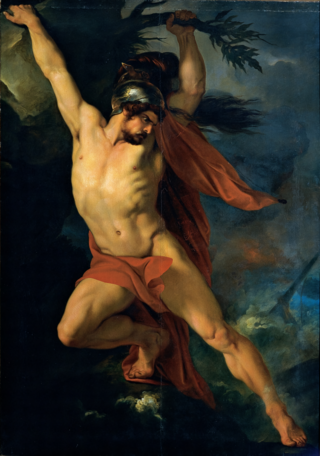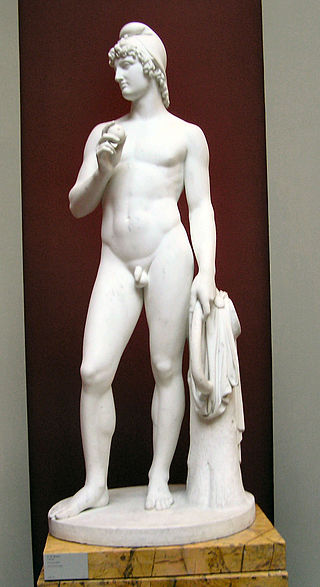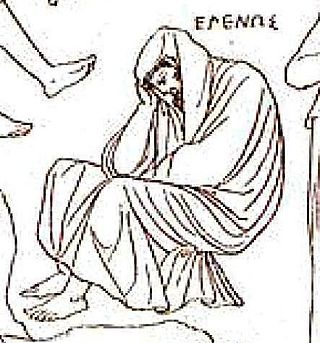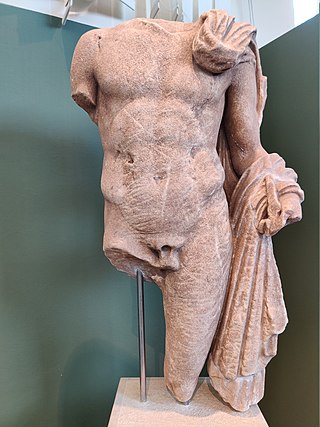
Ajax was a Greek mythological hero, son of Oileus, the king of Locris. He was called the "Ajax the Less", the "lesser" or "Locrian" Ajax, to distinguish him from Ajax the Great, son of Telamon. He was the leader of the Locrian contingent during the Trojan War. He is a significant figure in Homer's Iliad and is also mentioned in the Odyssey, in Virgil's Aeneid and in Euripides' The Trojan Women. In Etruscan legend, he was known as Aivas Vilates.

In Greek mythology, Priam was the legendary and last king of Troy during the Trojan War. He was the son of Laomedon. His many children included notable characters such as Hector, Paris, and Cassandra.

Paris, also known as Alexander, is a mythological figure in the story of the Trojan War. He appears in numerous Greek legends and works of Ancient Greek literature such as the Iliad. In myth, he is prince of Troy, son of King Priam and Queen Hecuba, and younger brother of Prince Hector. His elopement with Helen sparks the Trojan War, during which he fatally wounds Achilles.

In Greek mythology, Helenus was a gentle and clever seer. He was also a Trojan prince as the son of King Priam and Queen Hecuba of Troy, and the twin brother of the prophetess Cassandra. He was also called Scamandrios, and was a lover of Apollo.
Acamas or Akamas was a name attributed to several characters in Greek mythology. The following three all fought in the Trojan War, and only the first was not mentioned by Homer.

In Greek mythology, Machaon was a son of Asclepius; and the older brother of Podalirius. He and his brother led an army from Tricca in the Trojan War on the side of the Greeks.
The name Astyoche or Astyocheia was attributed to the following individuals in Greek mythology:

Troilus is a legendary character associated with the story of the Trojan War. The first surviving reference to him is in Homer's Iliad, composed in the late 8th century BCE.

The Aethiopis, also spelled Aithiopis, is a lost epic of ancient Greek literature. It was one of the Epic Cycle, that is, the Trojan cycle, which told the entire history of the Trojan War in epic verse. The story of the Aethiopis comes chronologically immediately after that of the Homeric Iliad, and is followed by that of the Little Iliad. The Aethiopis was sometimes attributed by ancient writers to Arctinus of Miletus. The poem comprised five books of verse in dactylic hexameter.
The Little Iliad is a lost epic of ancient Greek literature. It was one of the Epic Cycle, that is, the Trojan cycle, which told the entire history of the Trojan War in epic verse. The story of the Little Iliad comes chronologically after that of the Aethiopis, and is followed by that of the Iliou persis. The Little Iliad was variously attributed by ancient writers to Lesches of Pyrrha, Cinaethon of Sparta, Diodorus of Erythrae, Thestorides of Phocaea, or Homer himself. The poem comprised four books of verse in dactylic hexameter, the heroic meter.
The Cypria is a lost epic poem of ancient Greek literature, which has been attributed to Stasinus and was quite well known in classical antiquity and fixed in a received text, but which subsequently was lost to view. It was part of the Epic Cycle, which told the entire history of the Trojan War in epic hexameter verse. The story of the Cypria comes chronologically at the beginning of the Epic Cycle, and is followed by that of the Iliad; the composition of the two was apparently in the reverse order. The poem comprised eleven books of verse in epic dactylic hexameters.
In Greek mythology, Antenor was a counselor to King Priam of Troy during the events of the Trojan War.
Joseph of Exeter was a twelfth-century Latin poet from Exeter, England. Around 1180, he left to study at Gueldres, where he began his lifelong friendship with Guibert, who later became Abbot of Florennes. Some of their correspondence still survives.

There are a wide range of ways in which people have represented the Trojan War in literature and the arts.
In Greek mythology, Agenor was a Trojan hero.

The Iliad is one of two major ancient Greek epic poems attributed to Homer. It is one of the oldest extant works of literature still widely read by modern audiences. As with the Odyssey, the poem is divided into 24 books and was written in dactylic hexameter. It contains 15,693 lines in its most widely accepted version. Set towards the end of the Trojan War, a ten-year siege of the city of Troy by a coalition of Mycenaean Greek states, the poem depicts significant events in the siege's final weeks. In particular, it depicts a fierce quarrel between King Agamemnon and a celebrated warrior, Achilles. It is a central part of the Epic Cycle. The Iliad is often regarded as the first substantial piece of European literature.
In Greek mythology, Polybus or Polybius was the son of Antenor and Theano. He was the brother of Crino, Acamas, Agenor, Antheus, Archelochus, Coön, Demoleon, Eurymachus, Glaucus, Helicaon, Iphidamas, Laodamas, Laodocus, Medon and Thersilochus.
In Greek mythology, Pylaeus, son of Lethus, son of Teutamides, descendant of Pelasgus. He was one of the allies to King Priam in the Trojan War; he commanded the Pelasgian contingent together with his brother Hippothous. Pylaeus is hardly ever mentioned separately from his brother; they are said to have fallen in battle together by Dictys Cretensis and to have been buried "in a garden" according to the late Latin poet Ausonius.
In Greek mythology, Coön, also known as Cynon (Κύνων), was the eldest son of Antenor and Theano. Like most of his brothers, he fought and fell in the Trojan War.
In Greek mythology, Hippodamas may refer to the following characters:










